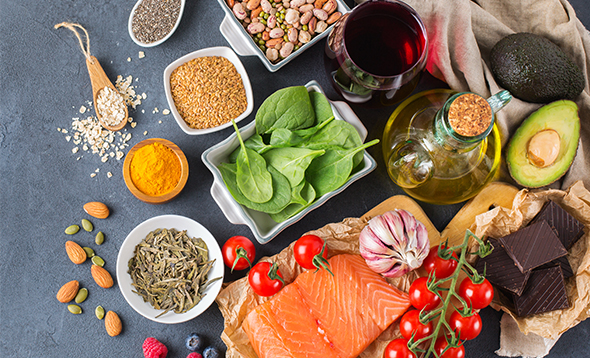That organic living is a conscious health choice
Fight High Cholesterol with Food
Studies show that regularly consuming foods rich in cholesterol-lowering compounds can help to return cholesterol levels to within the healthy range and keep them there.
With a few diet tweaks and food swaps, you can lower your cholesterol levels and risk of related cardiovascular diseases. Here are a few cholesterol-lowering food compounds and which foods they’re abundant in:
Soluble Fibres
What are they?
As carbohydrates, fibres come in insoluble or soluble forms. While neither can be broken down or absorbed, both have a physiological purpose. Insoluble fibre – the roughage of the diet – acts a digestive broom that aids in keeping you regular. Whereas, soluble fibre absorbs water and other substances in the GI tract to create a softening and bulking effect.
What do they do?
While both type of fibres are beneficial to health, soluble fibre is especially valuable when it comes to cholesterol. During digestion, soluble fibre clings to cholesterol-containing compounds and removes them from the system, thus helping to reduce overall cholesterol levels.
Where can you find them?
Fibre is readily available in whole foods such as whole grains including oats and barley, legumes such as beans, lentils and peas, as well as in fruits and vegetables.
Plant Sterols & Stanols
What are they?
Also known as phytosterols, plant sterols and stanols are plant compounds with chemical structures that resemble that of cholesterol.
What do they do?
When ingested, the digestive tract binds and absorbs these instead of the cholesterol in our foods. Because of this, the body has to pull cholesterol from the blood stream to perform certain vital functions. This further reduces cholesterol levels.
Where can you find them?
Thanks to its cholesterol-lowering properties, plant sterols are often added to specialty products such as spreads, milk, and yogurts. Other sources include wheat germ, bran, vegetable oils, legumes, peanuts, almonds, broccoli, cauliflower and Brussels sprouts.
Phytochemicals
What are they?
Phytochemicals are naturally occurring plant-based compounds and pigments.
What do they do?
There are many types of phytochemicals, but here are a few known to offer cholesterol benefits:
· Allicin inhibits the enzymes that produce cholesterol.
· Resveratrol lowers worrisome LDL cholesterols, prevents damage to vessel walls, and prevents blood clots.
· Curcumin reduces LDL cholesterol, and prevents plaque formation and atherosclerosis.
Where can you find them?
· Allicin – Fresh raw garlic.
· Resveratrol – Red wine, grapes, blueberries, cranberries, raw dark chocolate, pistachios and peanuts.
· Curcumin – Fresh or dried turmeric root.
Monounsaturated & Omega-3 Fatty Acids
What are they?
Monounsaturated and omega-3 fatty acids are two types of fats found in food.
What do they do?
· Omega 3 fatty acids are the firefighters within the family of fats. Consuming them regularly can help to reduce inflammation, and keep blood vessels smooth and clear.
· Monounsaturated fats are often regarded as cholesterol-lowering must-haves. When used in place of other forms of fat, such as saturated fats, they reduce both total and LDL cholesterol. Diets rich in this kind of fats also reduce abdominal fat and blood pressure, thereby lowering the risk of heart diseases.
Where can you find them?
· Omega-3 fatty acids – Cold water fish (salmon, tuna, mackerel, sardines), flaxseeds, chia seeds, sea vegetables, almonds and walnuts.
· Monounsaturated fats – Avocado, olive oil, nuts and seeds.
Whatever your health goal, Eve is here to help. She is available for private nutrition consultations, bespoke corporate talks or The Kitchen Edit, where she reviews your pantry to help you lead a healthy, nutritionally-balanced life. If you have any enquiries or would like to sign up for a consultation, please contact COMO Shambhala Urban Escape Singapore at +65 6304 3552 or [email protected].


























_1672804154.jpg)

_1611290459.jpg)